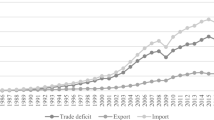Abstract
On 6 July 2017, after four years of negotiation, the EU reached an agreement with Japan over the main elements of a comprehensive free trade agreement. The breakthrough came at a time when progress on multilateral trade negotiations at the global level seemed out of reach and EU bilateral trade agreements faced strong public opposition. This paper examines the content of the new agreement with a view to global trade dynamics and assesses its main trade policy implications.
Similar content being viewed by others

Author information
Authors and Affiliations
Corresponding author
Additional information
Michael Frenkel, WHU – Otto Beisheim School of Management, Vallendar, Germany.
Benedikt Walter, WHU – Otto Beisheim School of Management, Vallendar, Germany.
Rights and permissions
About this article
Cite this article
Frenkel, M., Walter, B. The EU-Japan Economic Partnership Agreement: Relevance, Content and Policy Implications. Intereconomics 52, 358–363 (2017). https://doi.org/10.1007/s10272-017-0704-5
Published:
Issue Date:
DOI: https://doi.org/10.1007/s10272-017-0704-5



